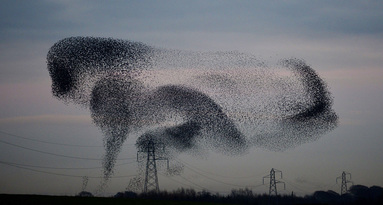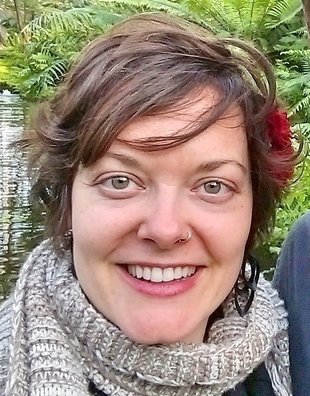 Sermon Snippets Ephesians 4:25-29 Have you ever watched a flock of sparrows leave a tree, suddenly, altogether, responding to some alarm or desire that sends them all straight up in the air and then, like a wave, to the west, perhaps, then swirling together as the most talented dance troupe, until you see them come to rest as one in a nearby tree? Virginia Woolf watched rooks out her window, and noticed that they looked like [quote] “a vast net with thousands of black knots in it, cast up into the air; which, after a few moments sank slowly down upon the trees until every twig seemed to have a knot at the end of it. Then, suddenly, the net would be thrown into the air again in a wider circle this time, with the utmost clamour and vociferation, as though to be thrown into the air and settle slowly down upon the tree tops were a tremendously exciting experience.” Virginia Woolf captures with impish eloquence a scene that has captivated most of us, when we’re blessed and astounded to be walking under or driving past the tree from which hundreds of birds suddenly emerge. Bird flocks have the coolest names: a flutter of sparrows, or a murmuration of starlings, or a chime of wrens, or a squabble of gulls. We give bird flocks these evocative names because their collective identity is as important as their individual identity. Birds in groups need their own names. What Virginia Woolf saw was one vast net with thousands of black knots in it – one net, not thousands of birds. We see the same group behavior in a school of fish, or more specifically, a fleet of bass, a battery of barracudas, and a company of angel fish. A school of fish moves as one creature, swirling around coral, darting away from a shark, diving into dinner. Colonies of ants and swarms of bees are so skilled at collective identity and group consciousness that they give us hope for our own societies. Social scientists study ants and bees looking for tips that we humans can use to give our own families and cities and countries more harmony and shared vision. We’re learning from other species too. Biologists see that flocks of birds and schools of fish have quicker reaction time together than apart. Starlings rolling from one tree to another in one huge wave react to obstacles in 20 milliseconds, but when a starling is flying alone, it needs 80 milliseconds to react to an obstacle. Does that make sense? Biologists get these bird flights on video, slow them down, and figure out that as a flock of starlings swirls through the sky, when some other bird or another obstacle appears in the flock’s path, individual birds react, changing direction, within 20 milliseconds. When biologists watch birds flying alone, it takes them 80 milliseconds to change direction. In the flock only a few birds see the obstacle, the rest simply follow the lead of the birds right in front of them. Finely attuned, a flock changes direction in a quarter of the time an individual bird can. Collective unconscious, or group intelligence, or whatever we might call it, gives the birds more ability together than they have apart. At least in U.S. culture, humans tend to assume we can be more agile on our own than together. If we were facing an obstacle course within a flock of birds or school of fish we’d likely worry about the slowpokes and the dawdlers and the inevitable arguments over which way to turn. We often think of one another as burdens more than blessings. At least when we’re trying to get somewhere, we want independence and autonomy. But starlings think and move four times as fast when they’re traveling as a flock. What invisible intelligence, what surprising skills, what bonus blessings do we have when we’re moving through life together?... Even before anyone studied mirror neurons or starling flock reaction time, we knew we belonged to one another physically. We read at least 12 times in the gospels about Jesus being “moved with compassion” or sometimes mistranslated “moved with pity.” The Greek word is splangchnizomai and means feeling in the gut, being moved in the bowels. The gospels writers tell us at least 12 times that Jesus felt people’s passion and pain in his gut. We are members of one another physically and spiritually. We feel one another’s emotions whether or not we want to.... We are members of one another. We change each other’s heart rates, we fire each other’s neurons, we get each other to yawn, we move each other’s bowels! Paul tells the church that we must speak only what is useful for building up, so that our words give grace to one another. When we realize how much power we have over one another, why would we be careless? We forget. We get in a long, slow-moving line and get caught up in our own world, forgetting that we’re impacting everyone around us. But we know in our core that we are members of one another.... Your heart, your brain, your gut, your words, your deeds are spreading through this room – what do you want to give us with your huge and holy power?..."
0 Comments
Leave a Reply. |
Archives
January 2022
|


 RSS Feed
RSS Feed